-
 Barca edge Real Madrid in extra-time to win wild Copa del Rey final
Barca edge Real Madrid in extra-time to win wild Copa del Rey final
-
'Legendary' Eubank Jr beats Benn in grudge bout
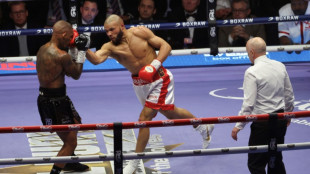
-
 Thunder sweep past Grizzlies into NBA playoffs 2nd round, Cavs on brink
Thunder sweep past Grizzlies into NBA playoffs 2nd round, Cavs on brink
-
South Korea's Ryu and Japan's Saigo share LPGA Chevron lead

-
 Canada leaders make closing pitches in campaign upended by Trump
Canada leaders make closing pitches in campaign upended by Trump
-
De Bruyne's Man City exit 'so difficult' for Guardiola

-
 'No regrets' for Amorim over Man Utd move
'No regrets' for Amorim over Man Utd move
-
Lyon and Strasbourg win to close in on Europe, Montpellier relegated from Ligue 1

-
 Toulouse thrash Castres as Top 14 pursuers stumble
Toulouse thrash Castres as Top 14 pursuers stumble
-
Djokovic crashes to nervous Arnaldi in Madrid opener, Swiatek advances

-
 Olympic champs Russell, Davis-Woodhall win at Drake Relays
Olympic champs Russell, Davis-Woodhall win at Drake Relays
-
Browns end Sanders long draft slide

-
 Cavs crush Heat, on brink of NBA playoff sweep
Cavs crush Heat, on brink of NBA playoff sweep
-
Fire rages after major blast at Iran port kills 8, injures hundreds

-
 Kiwi Beamish wins Penn Relays 1,500m crown with late kick
Kiwi Beamish wins Penn Relays 1,500m crown with late kick
-
Mbappe on Real Madrid bench for Clasico Copa del Rey final

-
 England survive France fightback to seal Women's 6 Nations slam
England survive France fightback to seal Women's 6 Nations slam
-
Palace sweep past Villa to reach FA Cup final

-
 CAF appoint Moroccan Lekjaa first vice-president
CAF appoint Moroccan Lekjaa first vice-president
-
Major blast at Iran port kills 5, injures hundreds

-
 Rodgers vows to stay with Celtic after fourth successive Scottish title
Rodgers vows to stay with Celtic after fourth successive Scottish title
-
Ipswich relegated as Newcastle, Chelsea boost top five bids

-
 Canada leaders make final pitches in campaign upended by Trump
Canada leaders make final pitches in campaign upended by Trump
-
Mullins -- Ireland's national training treasure

-
 US, Iran say progress in 'positive' nuclear talks
US, Iran say progress in 'positive' nuclear talks
-
Mullins emulates O'Brien with second successive trainer's title
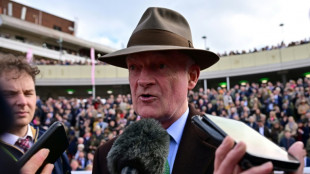
-
 Ipswich relegated after one season in Premier League
Ipswich relegated after one season in Premier League
-
Just Stop Oil activist group holds final march
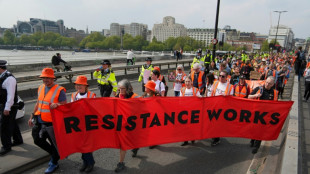
-
 Djokovic crashes to nervous Arnaldi in Madrid opener
Djokovic crashes to nervous Arnaldi in Madrid opener
-
Syria's Kurds demand 'democratic decentralised' Syria
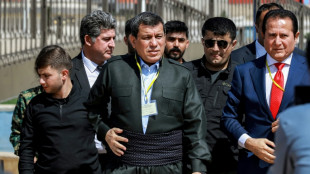
-
 Leverkusen win to delay Bayern and Kane's title party
Leverkusen win to delay Bayern and Kane's title party
-
Buenos Aires farewells native pontiff with tears and calls to action
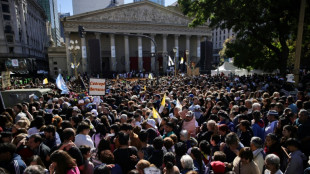
-
 Turkey's opposition says Erdogan's canal plan behind latest arrests
Turkey's opposition says Erdogan's canal plan behind latest arrests
-
Maresca hails 'nasty' Chelsea as top five bid stays alive

-
 Trump raises Putin doubts after Zelensky talks at pope's funeral
Trump raises Putin doubts after Zelensky talks at pope's funeral
-
Major blast at Iran port kills 4, injures hundreds

-
 Napoleon's sword to be sold at auction in Paris
Napoleon's sword to be sold at auction in Paris
-
Iran, US discuss nuclear deal in third round of talks

-
 Buenos Aires farewells native pontiff with call to action
Buenos Aires farewells native pontiff with call to action
-
Warholm sets hurdles world record at Diamond League, Holloway shocked

-
 US students 'race' sperm in reproductive health stunt
US students 'race' sperm in reproductive health stunt
-
Wikileaks founder Assange joins crowds for pope funeral

-
 Leader Marc Marquez claims Spanish MotoGP sprint victory
Leader Marc Marquez claims Spanish MotoGP sprint victory
-
Celtic win fourth successive Scottish Premiership title

-
 Jackson ends drought as Chelsea boost top five push
Jackson ends drought as Chelsea boost top five push
-
Warholm sets 300m hurdles world record in Diamond League opener

-
 Major blast at south Iran port kills 4, injures hundreds
Major blast at south Iran port kills 4, injures hundreds
-
Russia says retook Kursk from Ukraine with North Korean help

-
 Francis laid to rest as 400,000 mourn pope 'with an open heart'
Francis laid to rest as 400,000 mourn pope 'with an open heart'
-
Trump, Zelensky meet on sidelines of pope's funeral

Nuclear weapons for Poland against Russia?
As Donald Trump’s second term as U.S. President intensifies global tensions, a volatile mix of international defiance and regional military posturing is emerging, with Poland at the centre of a brewing storm. Amidst protests against Trump’s policies, speculation about nuclear escalation and Poland’s strategic moves against Russia have raised alarms, encapsulated in the provocative phrase circulating among activists and commentators: "We are ready for war." Yet, the reality behind these developments remains grounded in diplomatic friction and military preparedness rather than imminent conflict.
Trump’s inauguration on 20 January 2025 marked a return to his "America First" stance, including a pledge to reassess U.S. commitments to NATO, announced in a speech in Texas on 25 January. This has sparked outrage across Europe, with protests erupting in cities like Paris and Berlin. On 28 January, French activist Élise Moreau told a crowd of 12,000 outside the U.S. Embassy in Paris—according to police estimates—that "we are ready for war" against Trump’s "disruptive unilateralism." Similar sentiments have echoed in Warsaw, where Polish citizens and officials fear that a weakened NATO could embolden Russia’s ambitions in Eastern Europe.
Poland’s response has been swift and assertive. On 5 March, the Polish Ministry of Defence confirmed the deployment of an additional 10,000 troops to its eastern border with Belarus and Ukraine, citing "heightened Russian military activity" in the region. This followed reports from the Ukrainian General Staff on 2 March that Russia had amassed 50,000 troops near its western frontier, though Moscow denied any aggressive intent. Poland’s Foreign Minister, Anna Kowalska, stated on 7 March that "Warsaw will not wait for threats to materialise," framing the troop surge as a defensive "gambit" to deter Russian advances.
The spectre of nuclear weapons has further inflamed rhetoric. On 10 March, a senior Polish MP from the ruling Law and Justice Party, Janusz Kowalski, suggested in a televised debate that Poland might seek NATO nuclear sharing agreements "if the U.S. wavers." This echoed Trump’s own comments on 8 March in Florida, where he hinted at reconsidering America’s nuclear umbrella over Europe, stating, "Allies need to pay their share, or they’re on their own." No evidence suggests nuclear weapons are currently "on the way" to Poland, but the remarks have fuelled speculation and alarm, amplified by posts on X claiming "nukes" are imminent.
Across the Atlantic, Trump has dismissed the backlash. At a rally in Michigan on 15 March, attended by an estimated 18,000 supporters according to local authorities, he called European critics "freeloaders" and reiterated his intent to renegotiate defence pacts. The White House followed this with a statement on 16 March, asserting that "no changes to NATO’s nuclear posture are under consideration," attempting to quell fears of escalation.
In Europe, reactions vary. Germany’s Foreign Ministry expressed "deep concern" on 12 March about Poland’s troop movements, urging restraint to avoid provoking Moscow. Meanwhile, NATO Secretary General Mark Rutte announced on 17 March that the alliance would hold emergency talks in Brussels next week to address "cohesion and deterrence" amid Trump’s pressures. Analysts note that Poland’s actions align with its long-standing policy of bolstering its military—its defence budget reached 4% of GDP in 2024, per World Bank data—reflecting fears rooted in Russia’s 2022 invasion of Ukraine.
The "ready for war" rhetoric, while widespread, remains symbolic. Dr. Katarzyna Zielinska, a security expert at Jagiellonian University in Krakow, told this publication, "Poland’s gambit is about deterrence, not aggression. Talk of war—or nukes—is an expression of anxiety, not a plan." Still, the situation is precarious. The International Institute for Strategic Studies reported on 14 March that Russian air patrols near Polish airspace increased by 20% in February 2025 compared to the previous year, heightening regional tensions.
For now, the international rebellion against Trump and Poland’s military stance are distinct but intertwined threads in a broader tapestry of uncertainty. Protests continue—organisers in London are planning a rally for 25 March—while Poland’s border fortifications proceed. Whether these developments signal a genuine slide towards conflict or a recalibration of global alliances remains unclear. What is certain is that Trump’s shadow, and Russia’s looming presence, have set the stage for a critical test of resolve in the months ahead.

China Strikes Back: Tariff War

Spain: China's Gateway to Europe

Europe's Economic Self-Sabotage

Trump fails due to Russia's tough stance

Pope Francis: A Transformative Legacy

Portugal: Living Costs Soar

Is Australia’s Economy Doomed?

DOGE Fails to Slash U.S. Spending

Slovenia’s Economic Triumph

Next Generation EU a scam?

Can Poland Rescue Europe?



